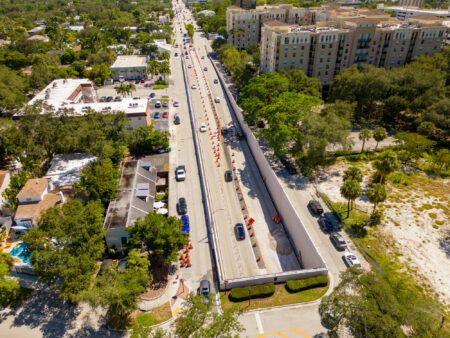Canada’s sixth most populous city, Mississauga, is implementing a multi-phase project to deploy a responsive state-of-the-art Advanced Transportation Management System (ATMS) that will manage traffic on its road network.
Situated in southern Ontario, and forming part of the Greater Toronto metropolitan area, Mississauga has presented its latest plans for the ATMS, which aims to better respond to changing traffic conditions and adjust traffic signals accordingly. The goals of the ATMS project are to: maximize the available capacity of the roadway network, minimize the impact of roadway incidents to users, pro-actively manage traffic, assist in the provision of emergency services, and create and maintain public confidence in traffic management. The total cost of the project is C$16.2m (US$12.3m) and implementation is expected to be completed by the end of 2020. The city is working closely with the Region of Peel and the Ontario Ministry of Transportation (MTO) as they have traffic lights in the city, and will be recovering approximately C$4m (US$3m) from these partner agencies.
The key components of Mississauga’s ATMS Project include:
Set up of a new Traffic Management Center (TMC) to allow traffic staff to monitor and respond to traffic related situations in real time;
Upgrade of the traffic signal communications system by using the city’s existing Public Sector Fiber Network as the backbone for signal communications;
Replacement of the existing traffic control system to the new open system architecture to accommodate advanced technology that will also include the replacement of the traffic controller units in the field;
Implementation of Intelligent Transportation Systems (ITS) to include traffic control cameras and traffic detection;
Future ATMS initiatives, such as adaptive traffic control, incident management, and traveler information systems.
The new ATMS will provide better integration with other agencies and active management of traffic in Mississauga. At the completion of the project, commuters will be able to receive real-time information on travel times and will have added flexibility in choosing their mode of travel, which will help decrease congestion and allow commuters to travel seamlessly to destinations within the city. Of the total project budget, the estimated cost for the new Traffic Management Center is C$3.9m (US$2.9m) and about C$7.1m (US$5.4m) for the Traffic Signal Control system replacement. The Traffic Signal Communication Upgrade will require an investment of approximately C$5.2m (US$3.9m) to design/build the communication network and devices.
“We are investing in the future by building a more reliable traffic control system. It will allow us to deal with the increasing traffic volumes and congestion on our roads,” explained Mickey Frost, Mississauga’s director of works, operations and maintenance. “ATMS will enable us to actively monitor travel conditions, influence the operation of traffic signals, disseminate information and interact with other transportation modes and agencies through the use of hybrid technologies and networks.”




